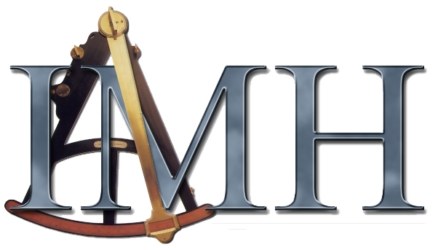The Institute of Maritime History (IMH) is a non-profit organization dedicated to the preservation and documentation of archaeological remains related to maritime history. Incorporated in 1994, and with field operations now in Delaware, Florida, Georgia, Maine, Maryland, Massachusetts, New Jersey, and Virginia, IMH is engaged in the study and conservation of shipwrecks, historic waterfront structures and landscapes, and submerged prehistoric archaeological sites. Through archaeological research, IMH seeks to inform and engage the public about the history and culture of seafaring, marine industries, and traditional maritime lifeways.
People of IMH
Joshua A. Daniel is the President of IMH. Josh received his MA in Anthropology (Nautical Archaeology Program) from Texas A&M University. After graduating from Texas A&M University, he worked as an archaeologist for Tidewater Atlantic Research, Inc. and the Institute for International Maritime Research in Washington, North Carolina. He worked with IMH on the CSS George Page project, a search for the Black Diamond off St. Clements Island, and was the Principal Investigator for the second part of IMH’s Dahlgren Gun Wreck project in 2018. He has conducted or contributed to numerous underwater archaeological projects in Cyprus, Egypt, Turkey, Italy, France, Mexico, Canada, and the United States. He is the owner and CEO of Seafloor Solutions, LLC, a subsea consulting company based in Chesapeake Beach, Maryland focusing on advanced underwater technologies including Autonomous Underwater Vehicles (AUVs) and Remotely Operated Vehicles (ROVs).
Raymond Hayes (Ray) is Vice President and Chairman of the Board of IMH. He is a native of Washington, DC and a graduate of Dunbar High School. He received his A.B. degree (cum laude) in Biology from Amherst College, Amherst, MA (1959), and both his M.S. (1961) and Ph.D. degrees (1963) in Human Anatomy from The University of Michigan, Ann Arbor, MI. Ray is now retired from faculty and administrative duties at Howard University College of Medicine. During his academic career, he taught on the medical faculty at Harvard Medical School, the University of Pittsburgh School of Medicine, Morehouse Medical School, and the University of the West Indies (Mona). He conducted research at the Discovery Bay Marine Laboratory and the Port Royal Laboratory (Jamaica) and served as Director of the McLean Marine Laboratory at the University of the Virgin Islands (St. Thomas, USVI). He is also a Research Associate with Dr. Paul Johnston, Maritime Curator, at the Smithsonian Institution’s National Museum of American History (NMAH), a researcher with Dr. Robert Neyland at the Naval History and Heritage Command (Washington Navy Yard), and a consultant at the International Institute of Maritime Research (Washington, NC) with Dr. Gordon Watts.
David Howe is the Secretary and Treasurer of IMH. He developed and leads the Submerged Historical Inventory Project (SHIP) – a volunteer program to find and assess shipwreck sites and report them to the State Historic Preservation Officer. Prior to his arrival at IMH, David was treasurer and president of the Maritime Archaeological and Historical Society (MAHS), program manager and legal advisor for the underwater archaeology branch at the Naval Historical Center in Washington DC, Assistant Supervisor of Salvage USN, a member of the US delegation to the 1989 Salvage Convention at the International Maritime Organization in London, and a trial attorney with the admiralty section of the US Department of Justice in Washington and New York. He received his bachelor’s degree from New York University and Juris Doctor with honors from Syracuse University. A retired Commander (Surface Warfare) USN, and a sailor since childhood, he has operated vessels ranging from small craft to large ships. He served as Officer of the Deck in a destroyer and an aircraft carrier as well as naval gunfire officer with the First Marine Division in Vietnam, taught piloting and navigation at Naval Officer Candidate School, and commanded a Mobile Inshore Undersea Warfare Unit. He is certified in SCUBA and hard-hat diving, and owns and operates Roper, a small research vessel that IMH uses for archaeological survey work in Chesapeake and Delaware Bays and in Florida.
